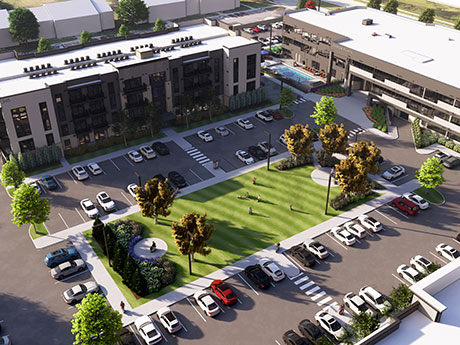The multifamily market in Detroit, characterized by its mature and stable nature, boasts robust operating fundamentals, making it an attractive investment destination. While markets across the country are facing swells of new apartment deliveries resulting in oversupply, Detroit is forecast to easily absorb all new units that come online in 2024.
In fact, 4,896 units are expected to be absorbed in 2024 while only 4,072 new units will be delivered — illustrating the strong, stable demand across the metro area.
The positive outlook for rent growth is another encouraging sign. When compared with 37 other top markets across the country, CoStar Group and Axiometrics rank Detroit as the No. 1 market for rent growth over the next five years.
Opportunities, Challenges
Like all markets across the country, Detroit is weathering headwinds brought on by high interest rates. However, the metro area has consistently demonstrated strong operating fundamentals and has distinguished itself as a market that investors should keep on their radar as it offers stable returns amid economic uncertainty.
It’s important to note that metro Detroit’s commercial real estate market has come a long way since a major downturn from 2008 through 2010 that was sparked by a global financial crisis.
Many investors may hold the incorrect assumption that the City of Detroit is stuck in a state of great instability stemming from its bankruptcy almost 16 years ago. Since 2008, the city has worked tirelessly to rebuild and has successfully revived its economy.
Simultaneously, the commercial real estate market has matured and has become known for its stable renter base yielding high absorption as well as its strong cash flows.
While the market demonstrates strong operating fundamentals, a major hurdle has been garnering outside capital to enter the market. Investors’ firsthand exposure to Detroit’s opportunities is crucial to understanding its appeal as an investment destination.
In the past two years, high interest rates and restricted transaction activity have been a challenge for the national multifamily market, as well as Detroit. Unlike younger markets like Austin, Phoenix and others in the Sun Belt region that are experiencing an influx of new apartment units as well as outside capital, Detroit faces the challenge of limited supply.
Being a mature market with a slower growth rate compared with newer metros nationally, the city struggles to attract significant outside interest without substantial population growth or positive employment trends.
This trend speaks to why it’s so important for investors to get boots-on-the-ground experience in the city in order to witness its potential.
Employer Expansions
The manufacturing sector, which accounts for approximately 12 percent of metro Detroit’s nonfarm payroll employment, is expected to lead the other job sectors in growth in 2024, according to Berkadia’s 2024 Forecast Report.
Magna International of America will be a major contributor to this growth. Magna’s 280,000-square-foot facility in Auburn Hills is expected to open this year, adding 530 workers. General Motors Co.’s 1.1 million-square-foot electric vehicle parts warehouse is expected to open in Auburn Hills in late 2024 and employ 1,050 individuals.
These contributors have the potential opportunity to add a projected 3,000 new households to the metro area. Despite delays due to pandemic-related challenges, the completion of 4,072 new apartments this year will accommodate some of these households, with around 25 percent focused on the Downtown, Midtown, and Rivertown submarkets.
Affordability Issues
There is a growing recognition among municipalities that affordable housing alone isn’t sufficient to combat the housing crisis in Detroit; there’s also a pressing need for workforce housing. One solution that could help to ease affordability challenges is changing restrictive zoning laws.
This would increase flexibility, allowing developers to build more affordable housing product types. Another solution lies in allowing municipalities to implement rent control, which has proven to benefit low-income tenants.
Ongoing initiatives brought forth by organizations such as the Local Initiatives Support Corp. (LISC) are also working to increase affordability across Detroit. The Detroit Housing for the Future Fund, managed by the LISC, is committed to preserving, developing and investing in affordable housing across the City of Detroit.
While there is no silver bullet to combatting the affordability crisis, initiatives aimed at increasing affordability, as well as state and local government incentives, are crucial in attracting investors to the market and addressing this issue.
Buyers Come Out of Hibernation
Despite the temporary slowdown in transaction activity over the past two years, Berkadia has remained steadfast in its pursuit of high-level deals. Over the past few months, transaction activity has begun to pick back up, illustrated by the current deals happening in metro Detroit.
Berkadia’s Detroit team is actively working on a number of transactions, with 16 deals on the market or in escrow. This uptick in transaction activity speaks to investors getting off the sidelines after an extended period of a wait-and-see mentality. It also points to a renewed optimism for the local market, as well as the Midwest region as a whole.
Kevin Dillon and Jason Krug, senior managing directors at Berkadia, specialize in the sale, refinancing and recapitalization of multifamily properties. They are based in Berkadia’s Southfield, Michigan, office. This article originally appeared in the March/April edition of Midwest Multifamily & Affordable Housing Business.


